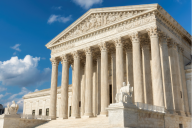You have /5 articles left.
Sign up for a free account or log in.
While we’ve heard widening discussion on diversity and inclusion among lesbian, gay, bisexual, transgender or queer students at colleges and universities across the nation, little of that conversation has focused on the importance of LGBTQ leadership at these institutions.
The demographics of leadership in higher education skews toward homogeneity -- older, white, male and straight is by far the norm. Entrée into academic leadership roles has been challenging for many groups, including women, BIPOC and LGBTQ people. As higher education seeks to correct structural discrimination, we must recognize the power of elevating members of these communities to leadership roles within our institutions.
To bring systemic change within a college or university, leadership must be representative of the diversity of the human family. Increasing the number of an institution’s LGBTQ leaders can positively influence the student body and overall culture of the institution. For example, studies suggest that engaged LGBTQ leadership in higher education can lead to increased allyship and encourage non-LGBTQ administrators to develop more LGBTQ-inclusive policies.
We are seeing progress on the journey to inclusion and representation in academics. LGBTQ Presidents in Higher Education, a group founded in 2010, has more than 100 members that are now or have previously served as an out president or chancellor of a college or university.
Today, I am an openly gay university president, but at one time, I was a kid from a small town in northern Minnesota and then a closeted college student searching for direction. At Mesabi Community College, just a few miles from my hometown, I became active in the theater and met the director, Chuck Rowland, who became my first role model of a professional gay man. His impact was profound: he helped me believe that one day I could come out and have a successful career. Rowland was an early leader in the gay liberation movement, having helped found the Mattachine Society, and he went on to found Celebration Theatre, Los Angeles’s first LGBTQ community theater.
His out leadership inspired me so that, as I built my career, I remembered the importance of letting my students know that I am a member of the LGBTQ community. As I reflect on the power of Rowland’s presence in my life, I’m honored to be in a position to pay his gift forward.
Our workforce has never been as diverse as it is today -- and not just from a racial or religious perspective. And now more than ever, companies are focused on incorporating diversity, equity and inclusion efforts into their corporate philosophies. But how can you have a truly authentic DEI initiative if your workforce does not relate to your leadership?
In a 2013 report by the Williams Institute at the University of California, Los Angeles, a research team reviewed 36 studies that evaluated the impact of LGBT-supportive policies or workplace climates on business outcomes. An overwhelming number of those studies seemed to suggest that LGBT-supportive policies or workplace climates are most strongly linked to more openness about being LGBT. They also found that LGBT-supportive policies and workplace climates had fairly strong links to less discrimination, improved health outcomes, increased job satisfaction and greater job commitment. And it makes sense -- when you feel supported by your leadership and comfortable in your own skin when surrounded by your colleagues, it’s bound to lead to greater satisfaction.
When LGBTQ leaders in higher education stand up and stand out to support LGBTQ communities, they send a signal to others that being out isn’t an obstacle to career growth. In fact, the OutNEXT/PwC Out to Succeed survey found that more than 60 percent of future LGBT leaders saw being gay as a positive influence on their careers.
Those of us in leadership positions in colleges and universities can continue this good work by acknowledging that:
- The closet still exists and, while perhaps protective at some points in life, it can ultimately be harmful to LGBTQ individuals at any age.
- There is power when you come out -- and power in creating spaces like support groups and clubs that facilitate acceptance and make the coming-out process easier for students, faculty members and others.
- Invisible minorities and their allies must stand up. That could be by supporting events sponsored by the LGBTQ student association, organizing and supporting faculty and staff groups, and establishing inclusive spaces. When I taught at St. Olaf College, we had a small sign that faculty members could place on their door to indicate support. Other examples include having staff members include their pronouns on their email signatures and creating unisex bathrooms.
- You can be the person who encourages and inspires others in the closet to be their best. Remember, you are always sending signals to those silently questioning their identity, so be intentional and kind. Use inclusive language and examples -- if talking about families, use examples of same-sex couples -- share your pronouns, acknowledge Pride month. In general, out, closeted and questioning individuals will notice both the presence and absence of inclusive and supportive comments.
There is room for more inclusion of the LGBTQ community by higher education leadership. Those of us who are out make way for students, faculty and upcoming leaders -- demonstrating that career advancement is possible and not limited by being a member of the LGBTQ community. Allies can do the same by promoting student and faculty/staff groups, reaching out to those groups and ensuring policies are in place that signal inclusion.
As university leaders, we are distinctly positioned to make a lasting impact on the lives of students, faculty, staff and other senior administrators, and we should serve as trustworthy allies in building a better institutional culture. As we wrap up Pride month, let us all commit to inspiring and fostering greater LGBTQ inclusivity.








